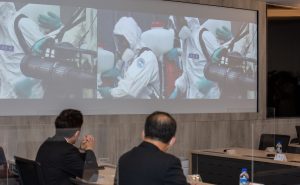As countries around the world locked down in 2020, Taiwan shone as a beacon of normalcy. Despite its geographical proximity to China, the island had remarkable success in containing the coronavirus, recording zero locally transmitted cases for an eight-month period between April and December and avoiding business and school closures.
That’s all over now. Taiwan has recorded 1,824 domestic infections since May 14. Before that date, it had recorded a total of only 135 local infections. The government has instituted a nationwide public mask mandate, along with new restrictions on businesses and public gatherings.
“The outbreak is still at its peak,” Health Minister Chen Shih-chung said at a Friday news conference.
Taiwan has faced both domestic and international pressure to respond to its first true domestic COVID-19 outbreak. Taiwan’s government had touted its success in combating the virus to help boost its international presence and win support from new allies as it combats an increasingly belligerent Chinese regime. The island’s semiconductor manufacturers are also being pressed to ramp up production to combat a global chip shortage, an effort which has already been exacerbated by Taiwan’s worst drought in decades.
Things began to unravel when an outbreak emerged in April at the Novotel airport hotel at Taoyuan International Airport, which had been used to house quarantining pilots. Taiwan last month reduced quarantine requirements for non-vaccinated pilots to three days. But the hotel put some pilots and crew members in a second building used to house domestic guests.
The city government of Taoyuan, where the hotel is located, said last week it had received a public complaint in February that the Novotel was being “used illegally.” But the government did not fine the hotel until May 8, after Taiwan had already logged 29 cases linked to the hotel outbreak.
The virus eventually spread to the “tea houses” of Taipei’s Wanhua district – adult entertainment venues that were frequented by infected pilots and crew members. Chen Chien-jen, an epidemiologist and Taiwan’s former vice president, told the BBC that contact tracing was made difficult as people who tested positive were unwilling to declare they had visited the tea houses.
Taiwan’s Control Yuan, a government ombudsman body, said Friday it would look into the tea houses and investigate why authorities had not cracked down on them. A sex worker advocacy group, meanwhile, urged the public to stop discriminating against workers at the tea houses, saying they have long been a part of the district’s economy and offer many services that are not related to sex.
Taiwan has also come under scrutiny for its long-standing strategy of administering few COVID-19 tests, even among those who show symptoms. This helped create a sentiment that Taiwan would remain free from the virus as long as it did not penetrate the country’s borders.
But locally transmitted cases of the virus are now continuing to increase and have spread to several hospitals. Taiwan’s cabinet said Friday it had not yet reached the criteria to institute a full lockdown, but some city mayors have told their citizens to prepare for further restrictions on activity.
Taiwan has struggled to obtain vaccines, and the domestic rollout has been slow. Chen, the health minister, urged the United States on Friday to provide assistance in obtaining COVID-19 vaccines, which one Taiwanese diplomat in New York has argued will help protect the island’s semiconductor industry.













